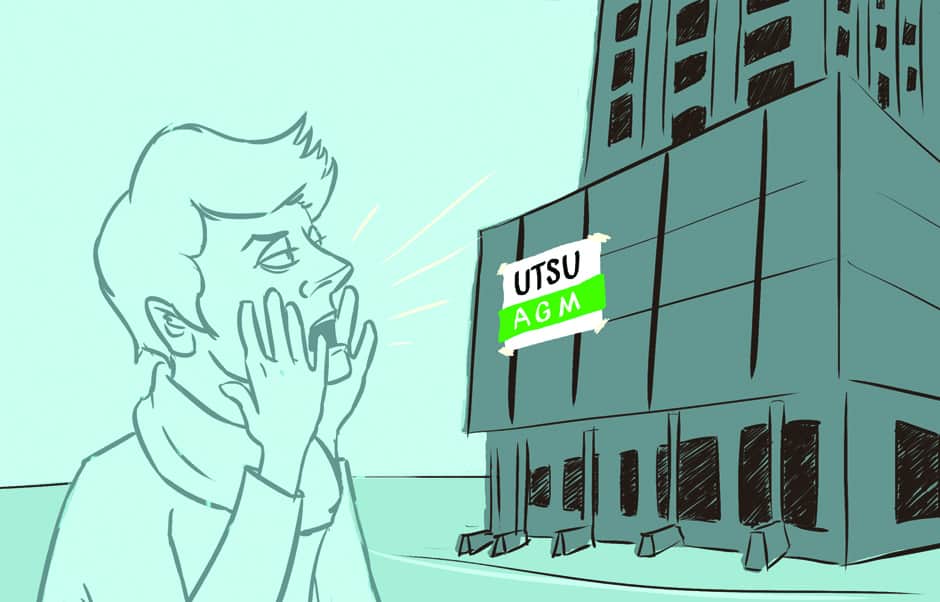The chances are, you do not spend a lot of time thinking about the University of Toronto Student’s Union (UTSU). You may not know, for instance, that as a full-time U of T student, you are automatically a part of the union’s membership. And even if you do know, perhaps you can’t find it within yourself to care. That’s not unreasonable — for years, the union has faced allegations of lack of transparency, undemocratic conduct, and lack of accessibility, which, together, make lobbying for reform nearly impossible.
This past year, the union has been criticized for a proposed change to the structure of its Board of Directors. Where the current board is made up of 40 representatives from various colleges, faculties, and professional programs, the UTSU is seeking to remove these positions and replace them with 10 “constituency directors,” which would represent marginalized groups on campus. The plan has faced heated criticism for failing to account for the representation of students who do not fit easily into the categories presented by the proposal.
Other recent concerns levelled against the union include accusations of democratic misconduct in the most recent executive election held last spring. Prime among these allegations is that members of the incumbency served on the union’s Elections and Referenda Committee, which represents a clear conflict of interest. Additionally, The Varsity reported the presence of Canadian Federation of Students (CFS)-affiliated union representatives from other universities campaigning for the incumbent slate.
More troubling than these issues themselves is the way that the union chooses to address them — it is notoriously difficult to work within the existing structure of the UTSU, which is rife with complicated procedures and legal minutiae. Engineering director Ryan Gomes, together with UTSU vice-president, university affairs Pierre Harfouche, compiled an alternative board structure that would include both the existing director positions with the addition of an equity committee. Gomes and Harfouche were given legal information by the union that allegedly conflicted with their plan minutes before they were to present it to the Board of Directors for a vote. They hoped to have it included in the order of business at this year’s AGM — the vote did not pass.
This encapsulates the main problem that exists with the UTSU’s AGM. The meeting exists in principle for the union’s membership, the students of this university, to engage in a direct dialogue with their representatives. However, in practice, the AGM has taken on a very different role.
In any democratic system, there should exist a series of tools at the electorate’s disposal for the express purpose of criticising their representatives and holding those in power to account. Successive years of electoral victory for the incumbency has allowed these tools to be dulled, and with them U of T students’ appetite for change. Our AGM has become a piece of theatre, lacking open discourse and responsive accountability. Dissenting voices are no longer offered a say in the conversation. An organization which purports to represent 47,000 full-time undergraduate students cannot stand idly by as their relationships with entire divisions deteriorate.
It is undeniable that there are both longstanding and recent issues between the union and its membership. Why does the existing order of business not reflect this? Currently, the contentious Board of Directors issue to be voted on is placed under a subsection of a larger point — “Approval of bylaw amendments motion.” It is given a bullet point, while activist campaigns take up an entire page. This is not to say that these items are not worthy of support, but merely that the order of business in its current form does not accurately reflect students’ sentiments towards the union. The fact that within the last two years Trinity College, Victoria College, and the Engineering Society (EngSoc) have all held successful referenda to divert their fees from the union speaks volumes to the state of affairs.
The life cycle of political conversations at this university is regretfully short, as every year a new generation inherits the status quo. It is this fact that the union has managed to exploit to maintain their influence on campus, knowing all the while that the majority of us won’t care enough to make a fuss. This is how allegations go unanswered, voter turnout rates remain low, and a small fraction of the school’s population manages to lobby on behalf of all without adequate consultation.
If you are against the changes that could be made to the structure of the Board of Directors at this year’s AGM, you should go and vote. If you feel that the meeting will largely be a fight between two immovable sides, don’t go — but do not simply let the subject drop. Make it a topic of conversation. Talk about what you don’t understand, what makes you angry, what you would do differently — we implore you, talk about it.
It’s easy to disregard, but, in fact, we are all part of a membership — a community in which we have a right to participate and to be heard. Our students’ union is broken, and the AGM is but one example of how. With a broken system that needs to be fixed, and no solution readily available, discourse is our only recourse. An open, productive dialogue will not likely occur at the AGM this Wednesday — but that does not mean we cannot foster one amongst ourselves without it.


